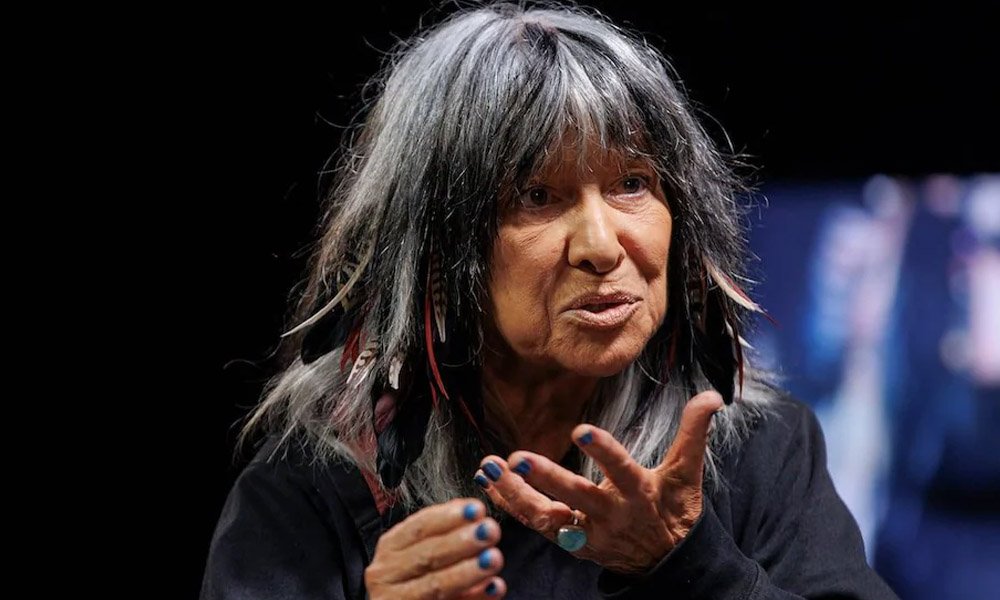Winifred Sainte-Marie, born Winifred Irene Kenrick on January 27, 1918, in Malden, Massachusetts, is best known as the adoptive mother of Buffy Sainte-Marie, a famous musician, activist, and educator. Though she may not have desired the spotlight, Winifred was an important figure in Buffy’s life, providing love and direction as she grew up in Wakefield, Massachusetts. Her legacy is inextricably linked to that of her daughter, a multifaceted woman who went on to become a legendary figure in the music industry, Indigenous rights advocacy, and education.
Adoption and Early Life
Buffy was adopted as a youngster by Winifred and her husband Albert Sainte-Marie, who raised her in Wakefield, Massachusetts. Buffy, born Beverly Jean Santamaria, has always talked fondly of her early years with Winifred, who reared her alongside her older brother Alan and younger sister Lainey. Buffy’s official birth certificate depicts her as being born to a white family in Massachusetts, but she has long claimed to be of Cree heritage, a claim that has come under investigation in recent years.
In interviews, Buffy has stated that Winifred informed her she was adopted and may have been born “on the wrong side of the tracks,” implying a complex and multifaceted tale about her origins. Despite the mystery surrounding her origin, Buffy has always had a strong connection to Indigenous culture, particularly the Piapot First Nation in Saskatchewan, Canada, where she was subsequently adopted. Questions concerning her Indigenous heritage arose in 2023, casting doubt on some areas of her personal background and generating issues about identity and belonging. However, Winifred continues to play an important part in Buffy’s life.
Buffy is Winifred Sainte-Marie’s daughter.
Winifred Sainte-Marie is the mother of Buffy Sainte-Marie, a well-known singer-songwriter and social activist. Buffy was born in 1941 in Massachusetts and grew up under the strong influence of her mother, who played an essential part in her development. Winifred’s support and counsel were critical in assisting Buffy in navigating the complexity of her cultural identity as a Cree woman, even though the specifics of Winifred’s own history are less well recorded. Buffy’s mother’s support inspired her to pursue her musical abilities and build a strong connection to her Indigenous heritage, which would later become a distinguishing characteristic of her work.
Winifred’s early experiences and principles profoundly influenced Buffy Sainte-Marie’s creative career and activism. Buffy’s achievements as a trailblazing figure in both music and Indigenous rights advocacy reflect the nurturing foundation provided by her mother. Winifred Sainte-Marie’s influence can be seen in Buffy’s commitment to social justice and her efforts to amplify Indigenous voices through her music, such as her famous protest song “Universal Soldier.” Buffy has utilized her platform throughout the years to raise awareness of the problems that Indigenous people endure, and her mother instilled this ambition in her from an early age.
Winifred’s Influence on Buffy
Winifred’s effect on Buffy was both maternal and cultural. She helped shape Buffy’s ideals and worldview. Winifred and her husband Albert, both of Mi’kmaq origin, created a nurturing atmosphere for their children. Buffy subsequently came to accept her cultural identity as a result of her upbringing, even if she was unaware of her biological heritage at the time.
Winifred’s candor regarding Buffy’s adoption may have aided Buffy’s awareness of her position in the world, which would later develop into a strong devotion to social problems. Buffy’s renowned song “Universal Soldier,” which became a peace anthem in the 1960s, exemplifies the principles she learnt growing up in the Sainte-Marie home.
Winifred Sainte-Marie’s Personal Life
Winifred Sainte-Marie’s personal life was one of humble service and devotion to family. She married Albert Sainte-Marie, and together they had three children. The couple’s Mi’kmaq ethnicity and affection for their children were important parts of their family dynamic, and while Winifred’s life was mostly private, her caring attitude influenced the life of her renowned daughter.
Winifred died on May 19, 2010, at the age of 92. She is survived by her children, including Buffy, and five grandkids. Despite her death, Buffy’s legacy continues on via her ongoing support for Indigenous people and substantial contributions to music, education, and activism.
The Questions About Buffy Sainte-Marie’s Indigenous Identity
In late 2023, Buffy Sainte-Marie’s Indigenous ancestry sparked national interest. According to the CBC, a birth certificate proved she was born in Stoneham, Massachusetts, to Albert and Winifred Sainte-Marie, contradicting Buffy’s prior comments of being born on the Piapot First Nation in Saskatchewan. This revelation prompted a broader discussion about identity and the complications of adoption, lineage, and personal histories.
Buffy has now spoken out about these disclosures, stating that, despite the anomalies in her birth documents, she firmly connects with Indigenous traditions, notably Cree. She has spoken openly about being adopted as an adult by the Piapot First Nation, and she considers the group to be her genuine family. This conversation highlights the mobility of identity, particularly in terms of adoption and cultural assimilation.
Winifred Sainte-Marie’s Lasting Impact
While Winifred Sainte-Marie was not as well-known as her daughter, her impact is still felt today. Winifred’s position as a mother, mentor, and cultural guide helped shape Buffy Sainte-Marie into the powerful person she is today. Buffy’s pioneering music, support for Indigenous peoples, and intellectual ambitions were certainly affected by Winifred’s loving presence throughout her early years.
Buffy Sainte-Marie’s retirement from live concerts in 2023 marked the end of an era in the music industry, but her legacy, fashioned in part by Winifred’s leadership, will live on. The mysteries surrounding Buffy’s lineage may never be entirely explained, but the intensity of Winifred’s maternal love and Buffy’s continued commitment to social justice ensure that both women’s legacies will go on for generations to come.
Conclusion
Winifred Sainte-Marie’s position in Buffy’s life is critical to understanding one of modern music’s most prominent Indigenous personalities. While Winifred spent much of her time in seclusion and with her family, she had a significant impact on Buffy. Winifred’s love, support, and cultural grounding shaped Buffy into the artist and activist she became. Despite continued speculation regarding Buffy’s early life and origins, her reputation is inextricably linked to that of her daughter. Although little is known about Winifred Sainte-Marie, her tale is an important part of Buffy Sainte-Marie’s journey.







